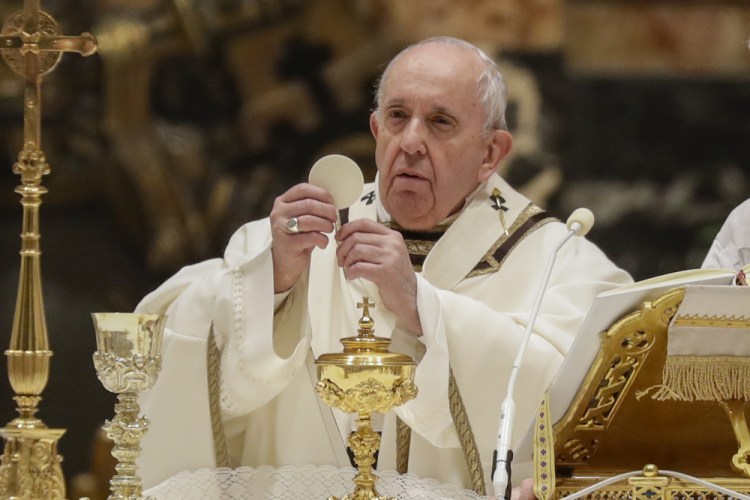ROME – Pope Francis on Monday offered a grim assessment of humanity’s response to the pandemic in a lengthy speech that highlighted aspects big and small from a year of isolation and “despair.”
He talked about domestic violence in homes under pandemic lockdown. He emphasized the job losses predominantly among off-the-books workers, with no safety net on which to rely. He described a generation of children, alone and in front of their computers, enduring the “educational catastrophe” of school shutdowns or distance learning.
The world, Francis said, “is seriously ill.”
“Not only as a result of the virus,” the pope continued, “but also in its natural environment, its economic and political processes, and even more in its human relationships.”
The pope typically uses his annual address to the Holy See diplomatic corps as a sweeping state-of-the-world assessment, ticking off areas of concern: humanitarian crises, climate change, famine, trafficking, wars. But this year, his primary area of concern seemed to be humankind itself.
“The pandemic shed light on the risks and consequences inherent in a way of life dominated by selfishness and a culture of waste, and it set before us a choice: either to continue on the road we have followed until now, or to set out on a new path,” Francis said.
He specifically called for universal access to basic healthcare, “equal distribution” of coronavirus vaccines, and the rehabilitation of multilateral organizations that have seen their “effectiveness compromised.”
While some of Francis’s prescriptions were not new, these were his most detailed comments to date assessing a pandemic that has killed more than 2 million people, caused a global recession, and interrupted many of the basic forms of human joy and gathering.
Normally taking place in the state hall of the apostolic palace, Francis mentioned that this year’s speech had been moved to a larger room to “respect the need for greater personal distancing.” Francis did not touch on the Vatican’s own fast-moving vaccination campaign – the pope himself has already been inoculated – but said “all of us certainly look forward to resuming personal contacts as quickly as possible.”
Still, he cautioned that the coronavirus was “devious and unpredictable.” Distancing measures and other forms of caution might still be required.
“It would be disastrous to put our trust in the vaccine alone, as if it were a panacea exempting every individual from constant concern for his or her own health and for the health of others,” Francis said.
He spent a part of his speech looking at the inequitable economic burden stemming from the pandemic. He said people in informal sectors were the “first to see their livelihoods vanish.” Lacking unemployment insurance or health care, some of those people, the pope said, have desperately sought other forms of income, “and risk being exploited through illegal or forced labor, prostitution and various criminal activities, including human trafficking.”
More broadly, Francis said, people have spent more time at home, in “greater isolation” than before.
“People pass longer hours before computers and other media, with serious consequences for the more vulnerable, particularly the poor and the unemployed,” he said.
As in previous speeches to diplomats, the pope hit on some of his hallmark issues, including the plight of migrants. But this time he connected some of their hardships to the pandemic. He said that border closures had caused people “to resort to ever more dangerous travel routes.”
Francis did not mention the United States, other than to express concern about wildfires in California, among other environmental warning signs. But he did speak, more abstractly, about democracies, and said one of its principles is that “different opinions do not threaten the power and security of states.”
He said he was particularly concerned about Myanmar, where last week the military seized power in a coup, detaining civilian leader Aung San Suu Kyi and halting several years of partial democratic reform.
“The path to democracy undertaken in recent years was brusquely interrupted by last week’s coup d’état,” Francis said. “This has led to the imprisonment of different political leaders, who I hope will be promptly released as a sign of encouragement for a sincere dialogue aimed at the good of the country.”
Send questions/comments to the editors.



Success. Please wait for the page to reload. If the page does not reload within 5 seconds, please refresh the page.
Enter your email and password to access comments.
Hi, to comment on stories you must . This profile is in addition to your subscription and website login.
Already have a commenting profile? .
Invalid username/password.
Please check your email to confirm and complete your registration.
Only subscribers are eligible to post comments. Please subscribe or login first for digital access. Here’s why.
Use the form below to reset your password. When you've submitted your account email, we will send an email with a reset code.